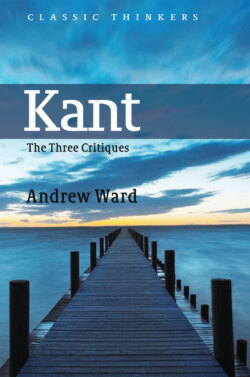Читать книгу Kant - Andrew Ward - Страница 21
Space and time
ОглавлениеNow the key question is: When we perceive objects in space or time, what is the relationship between this space or time (and so spatial or temporal objects), on the one hand, and our forms of outer or inner intuition (and so appearances), on the other? Restricting the possibilities to space, does space exist independently of any property of our mind and, hence, of outer intuition? If so, space must either exist in itself or be a relation between things in themselves. In either case, our perceptual knowledge of spatial objects would have to be gained by means of an inference from what exists in the mind, i.e. by means of an inference from appearances in our outer intuition to spatial objects existing outside the mind. Or is space to be identified with a property of our mind – that is, with pure outer intuition? If so, our perceptual knowledge of spatial objects will be the same as, or at least a subset of, our knowledge of appearances in outer intuition. On this latter alternative, no inference to what exists outside the mind, viz. to things in themselves, would be required for gaining perceptual knowledge. Similar questions and replies go for time.
When Kant specifically turns to discuss space and time, rather than the forms of our intuition, he immediately signals that what concerns him is how space and time are related to our outer and inner intuitions: ‘What then are space and time? Are they real existences? Are they only determinations or relations of things, yet such as would belong to things even if they were not intuited? Or are space and time such that they belong only to the form of intuition, and therefore to the subjective constitution of the mind, apart from which they could not be ascribed to anything whatsoever?’ (A 23/B 37).
Three views of space and time are on offer here; and it seems clear that Kant regards them as exhaustive. According to the first, the Newtonian (or absolute) view, space and time exist not only independently of being perceived, but independently of any objects (understood as things in themselves) in space or time. This is the view being referred to when it is asked if space and time are real existences. According to the second, Leibnizian (or relational), view, space and time do exist independently of being perceived, but do not exist independently of things in themselves. Space and time are merely the relations holding between things in themselves, which we confusedly perceive by means of sensations in our minds. This is the view that is being referred to when it is asked if space and time are only relations or determinations of things (in themselves), yet such as would belong to things (in themselves) even if they were not intuited.
Kant rejects both these views in favour of a third: viz. that space and time are to be equated with our outer and inner a priori intuitions, respectively. This is the view that he is referring to when he asks if space and time ‘belong . . . only to the subjective constitution of the mind, apart from which they could not be ascribed to anything’. He provides two types of argument for this third view and against the alternative, Newtonian and Leibnizian, views. The first type he calls the ‘Metaphysical Exposition’ of our concepts of space and time; and the second, he calls the ‘Transcendental Exposition’ of these concepts. In dealing with both these expositions, I shall first discuss space and then deal, much more briefly, with time.
